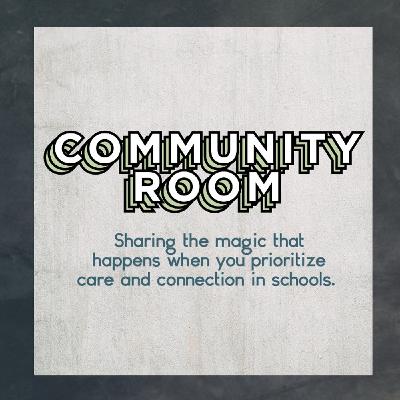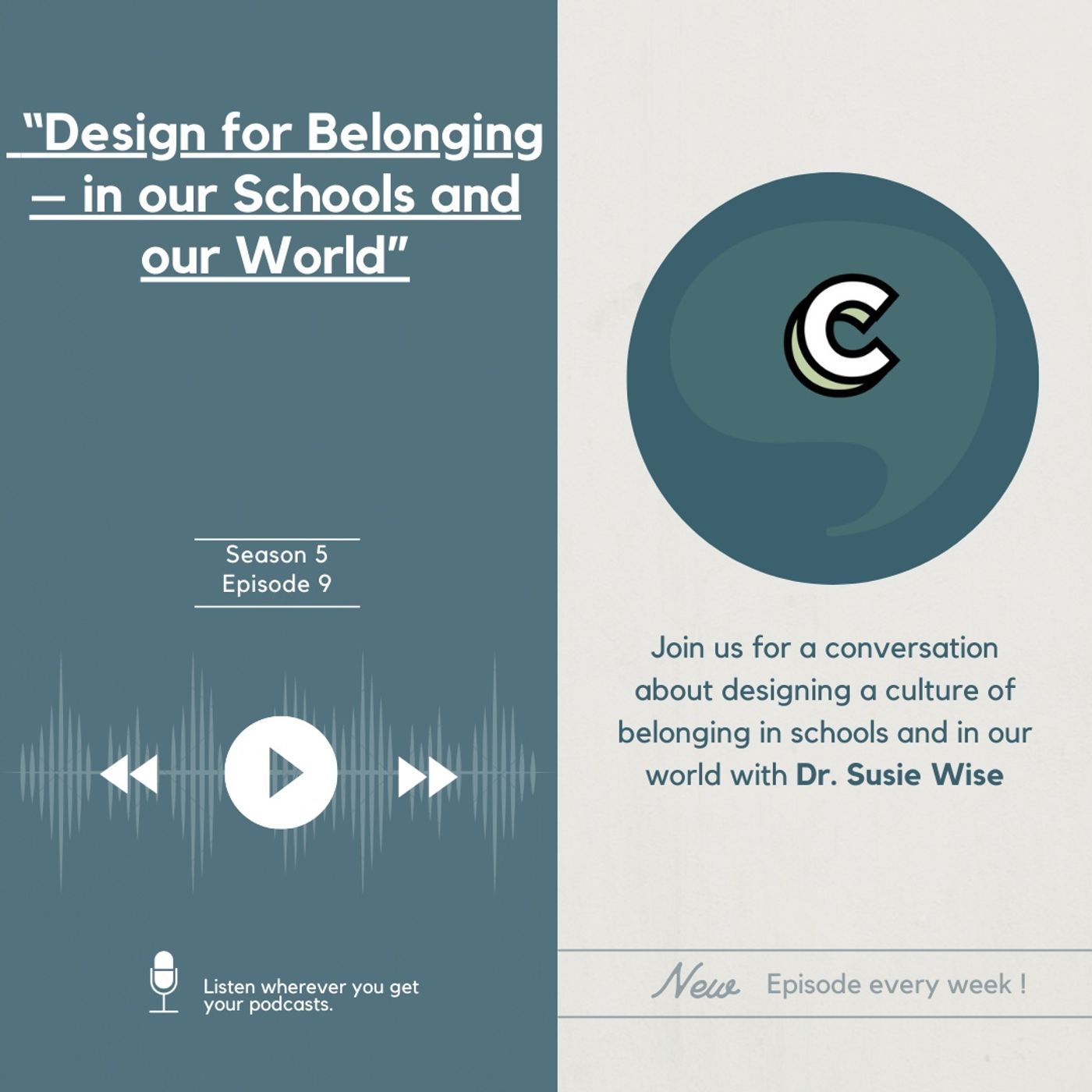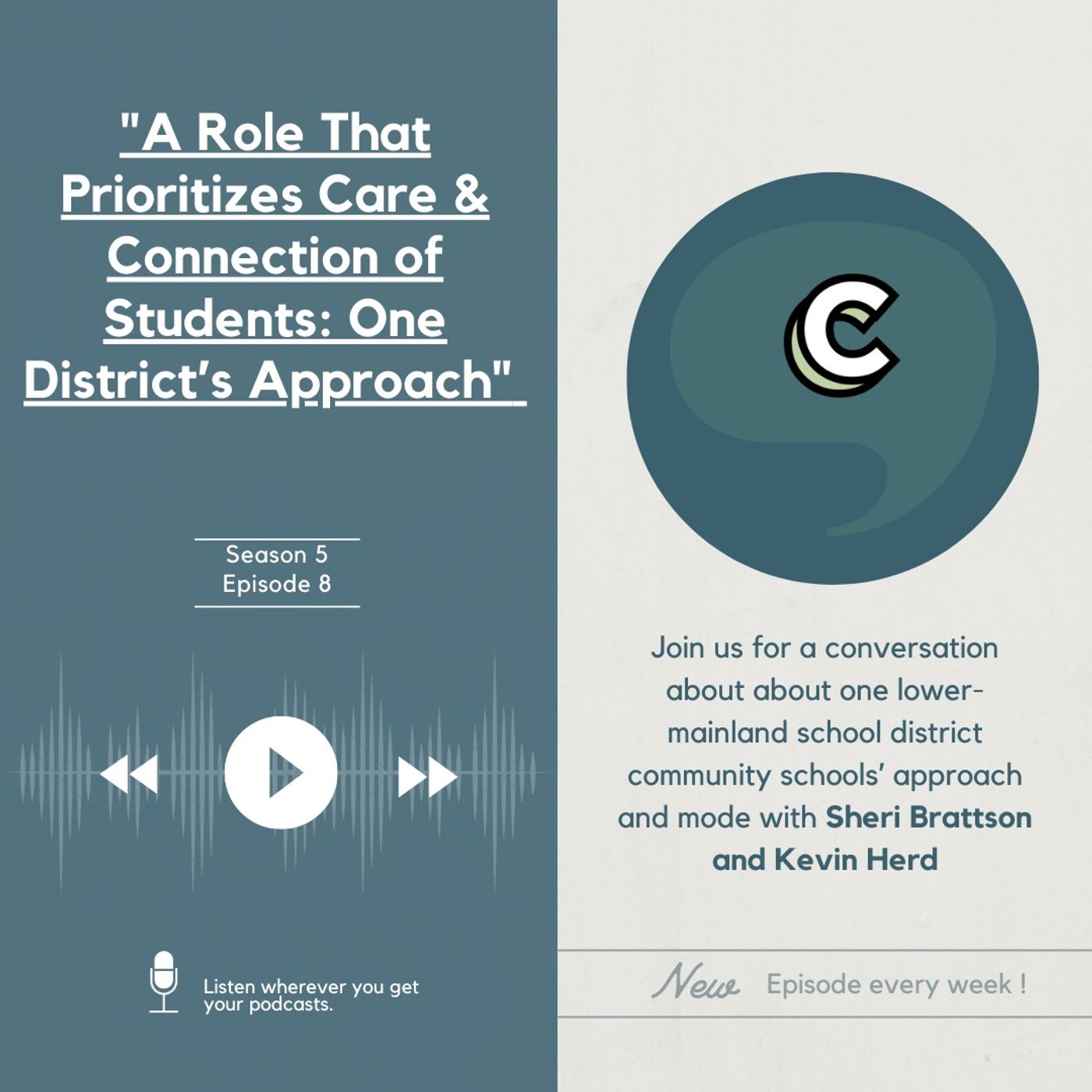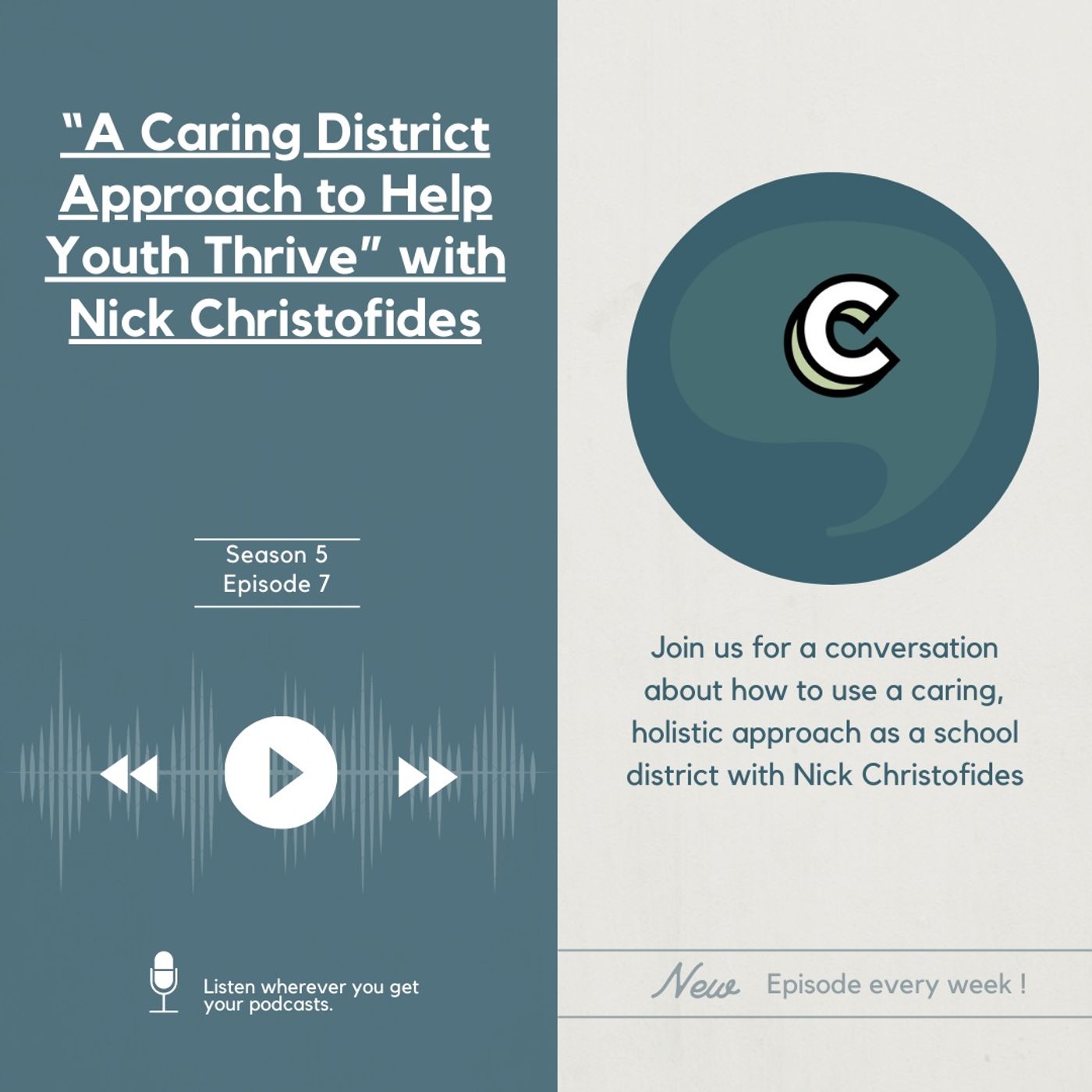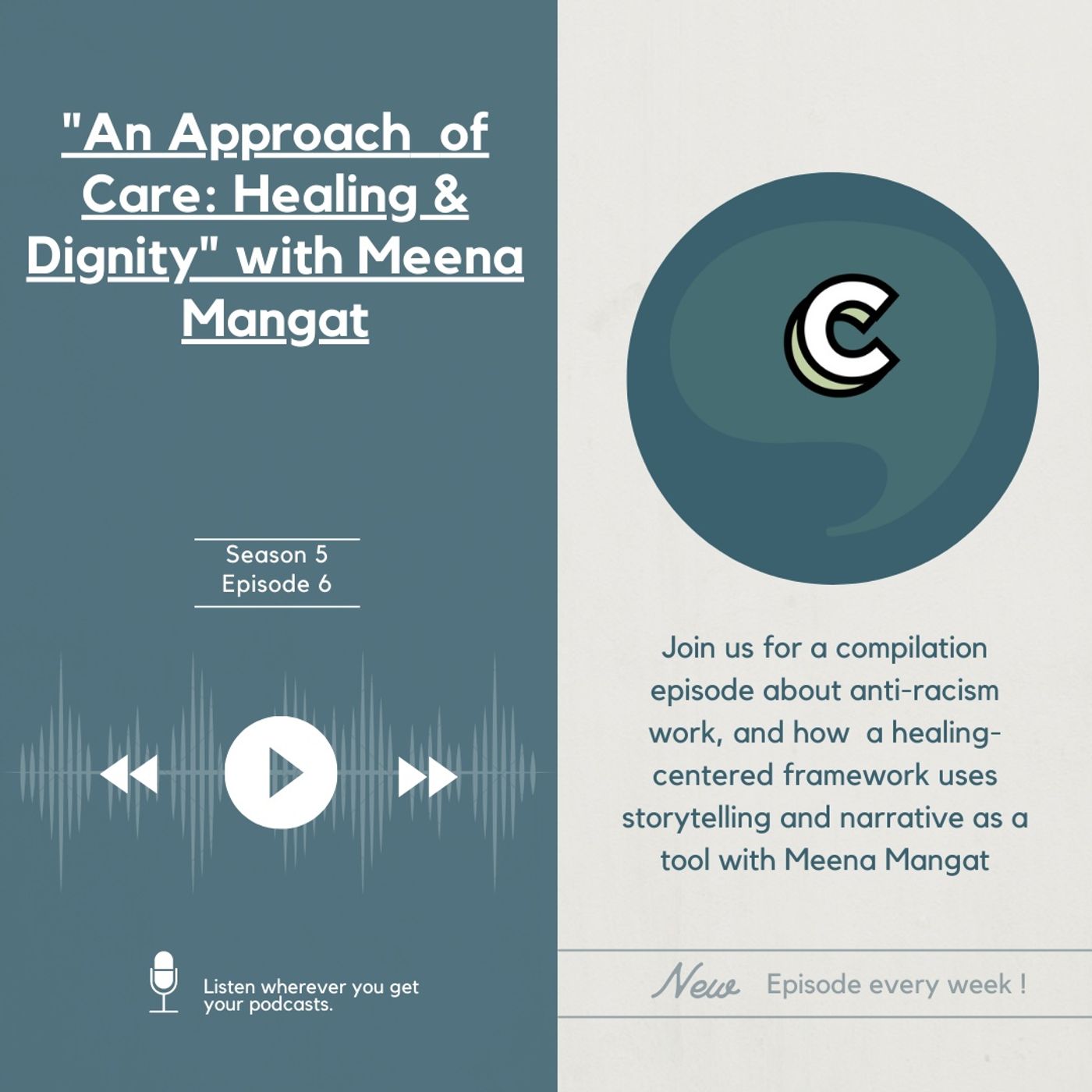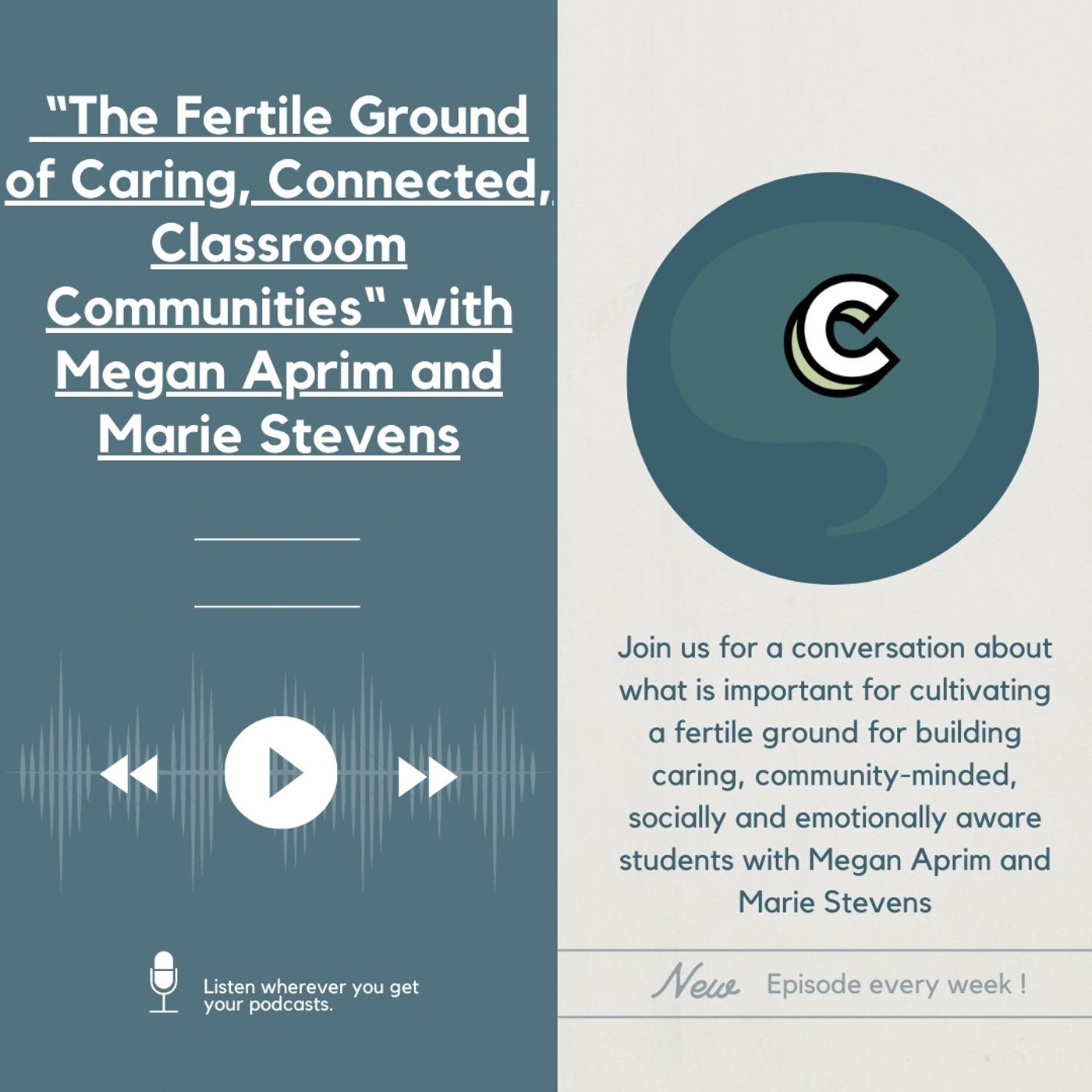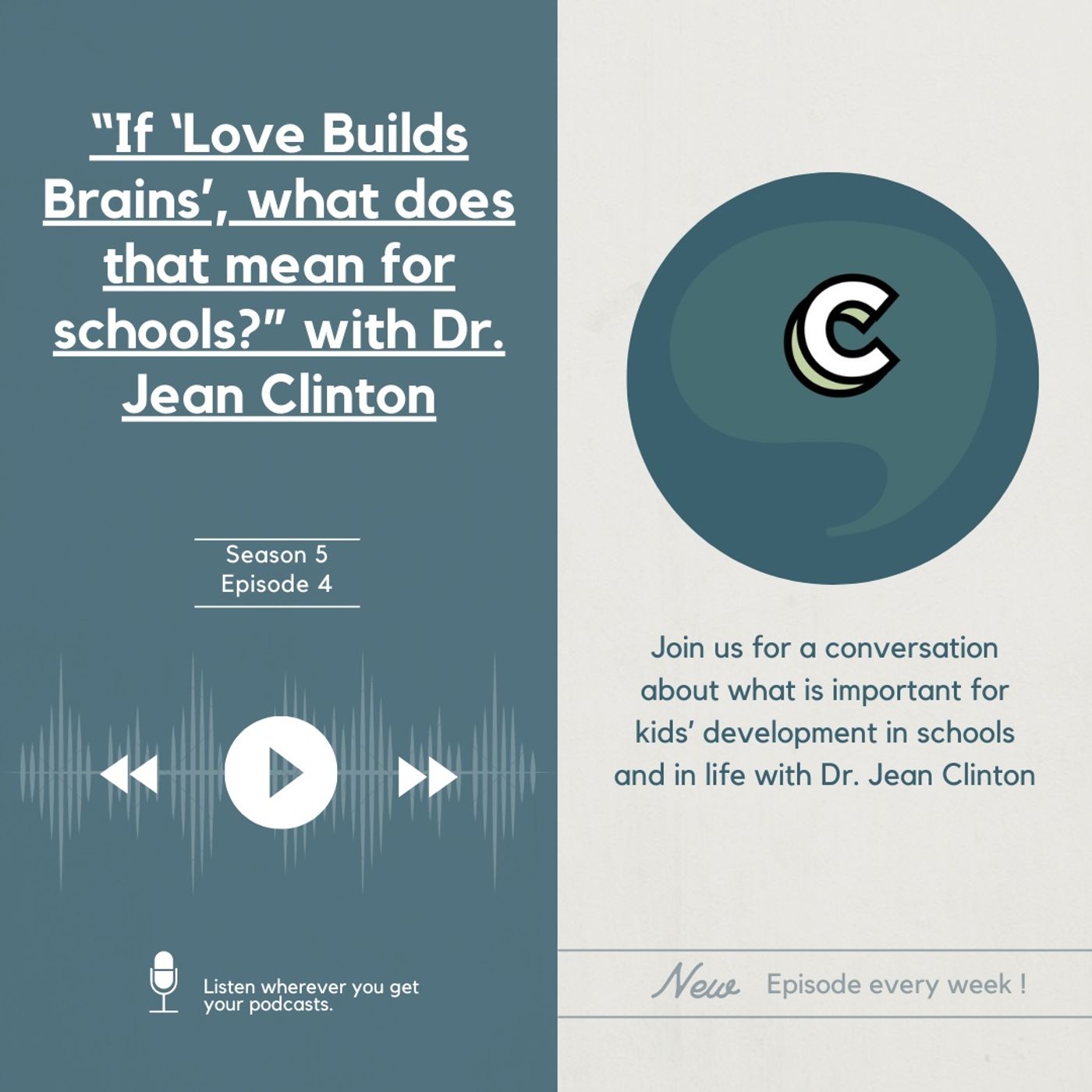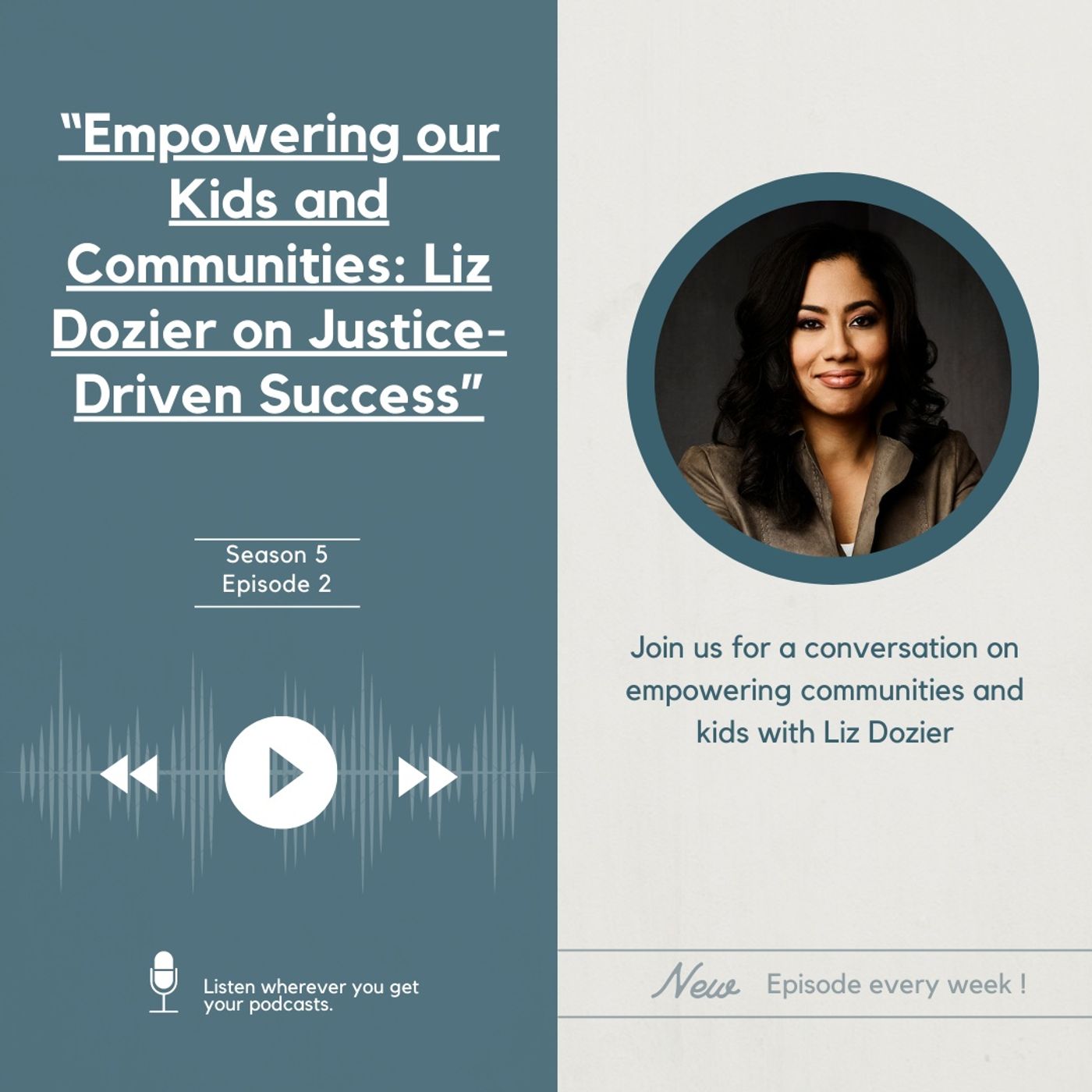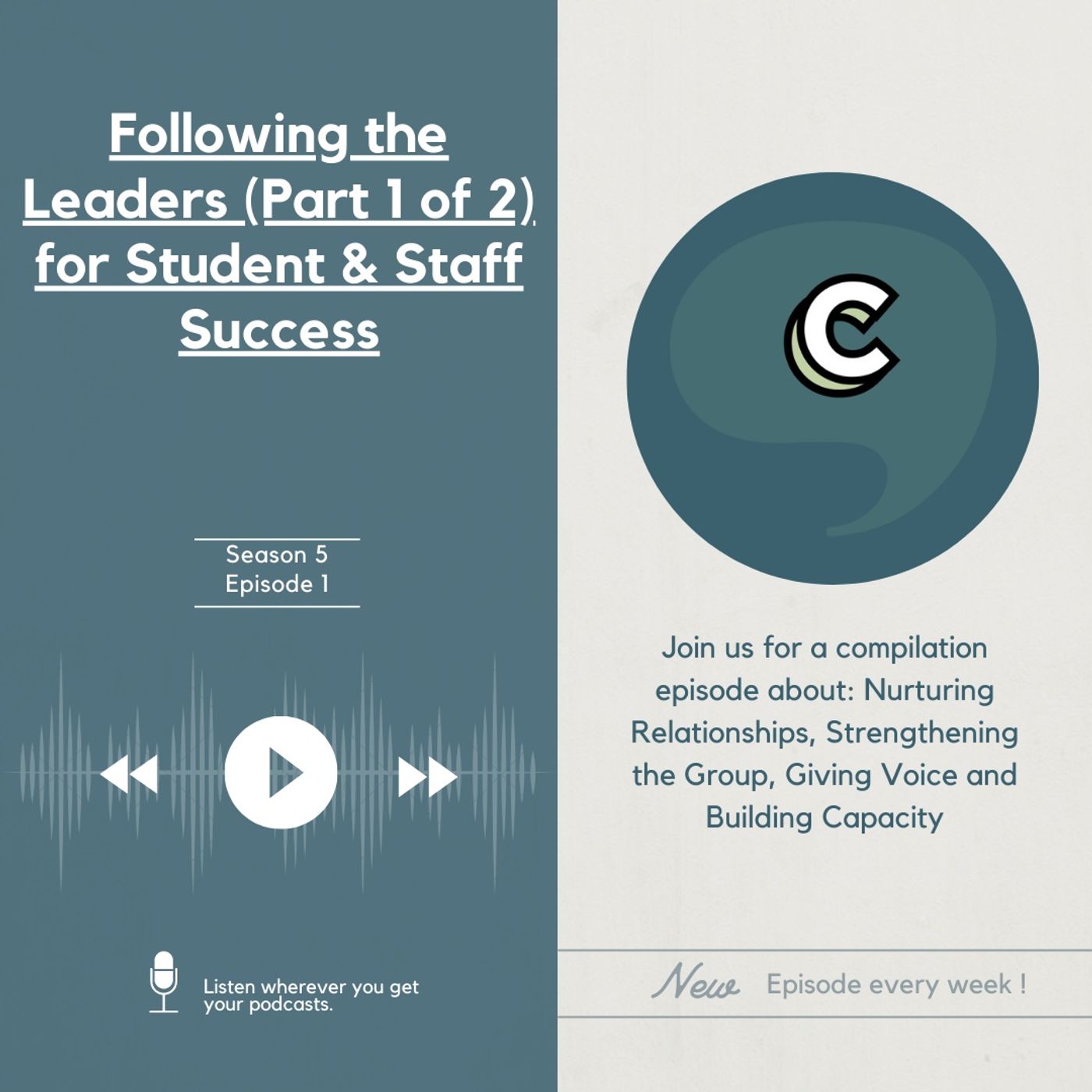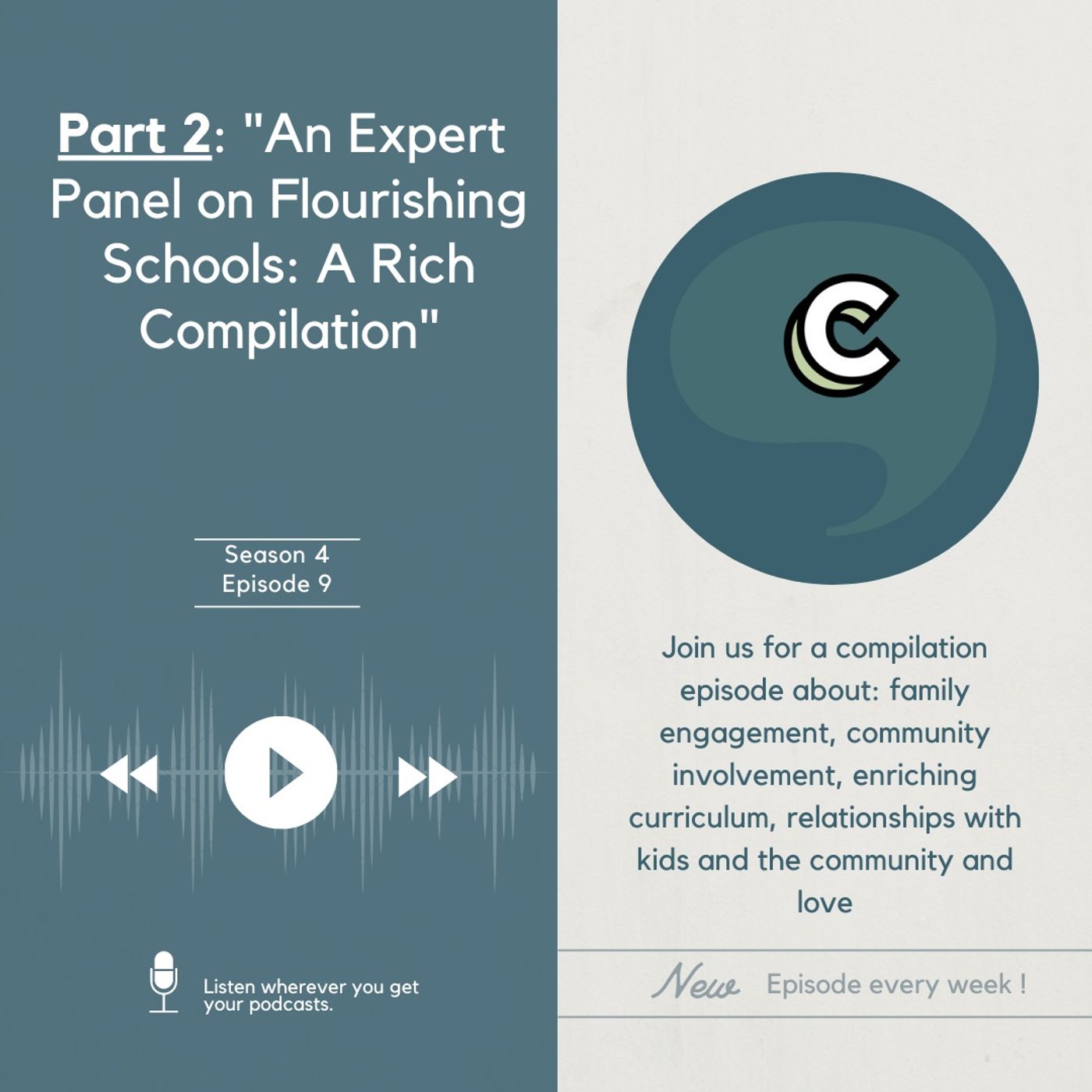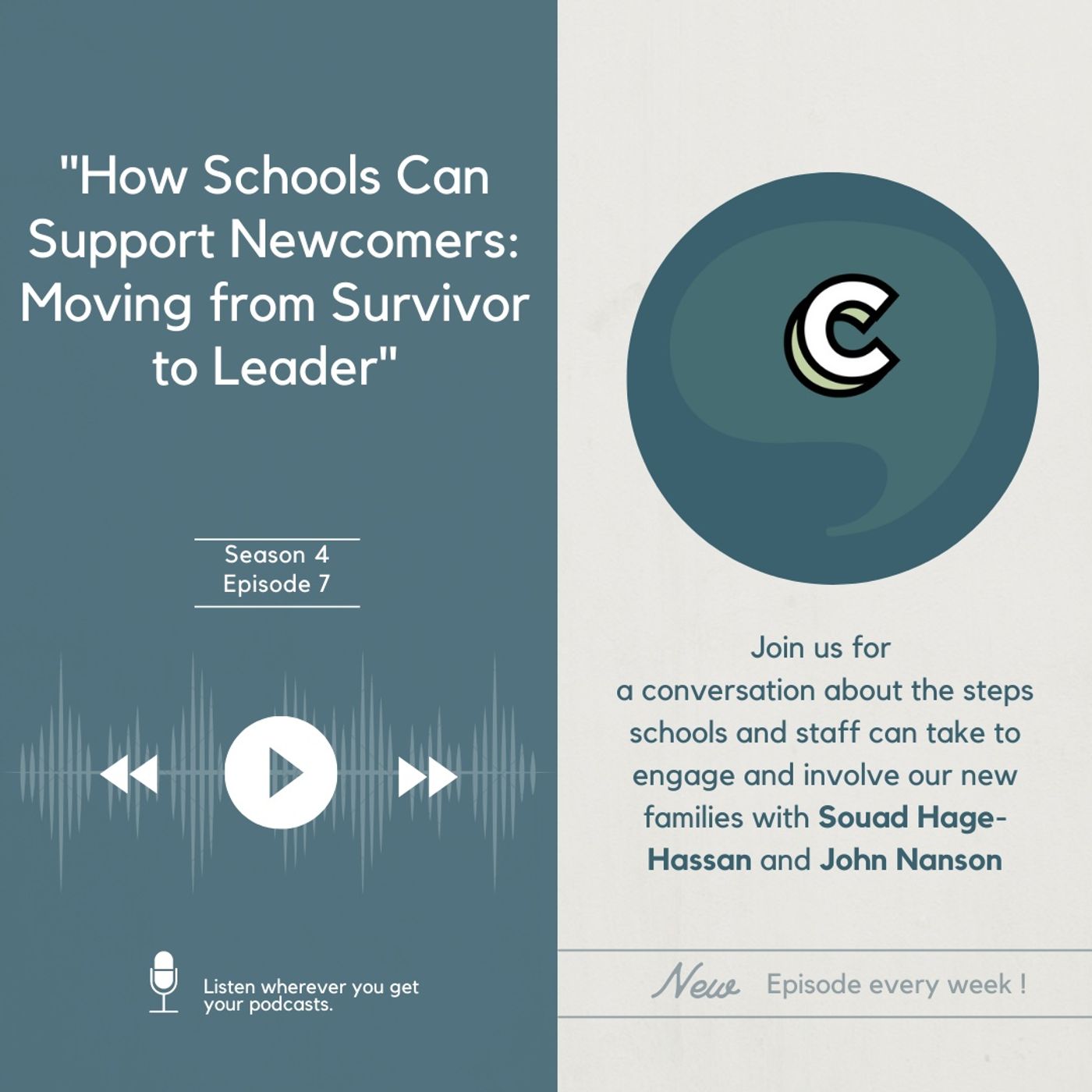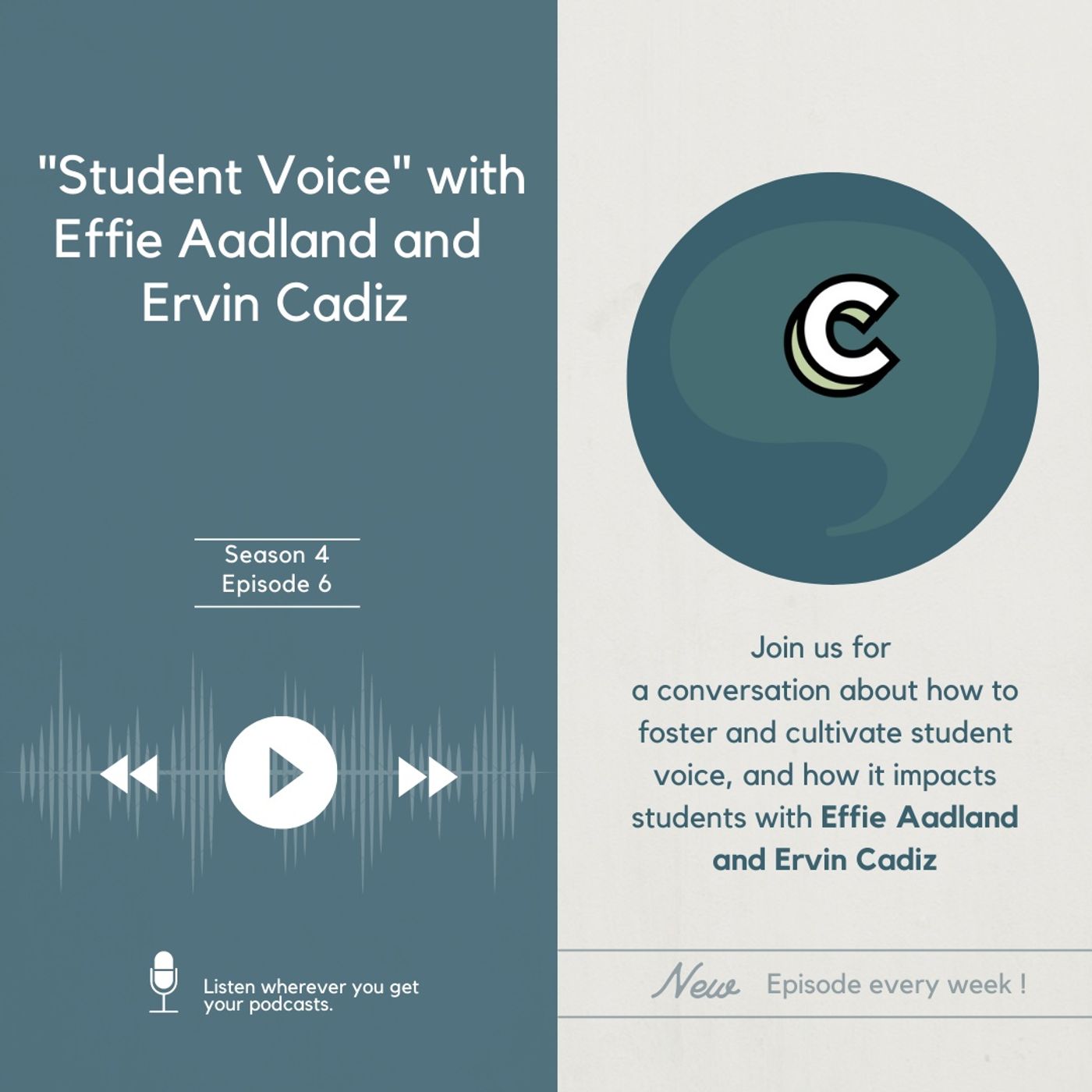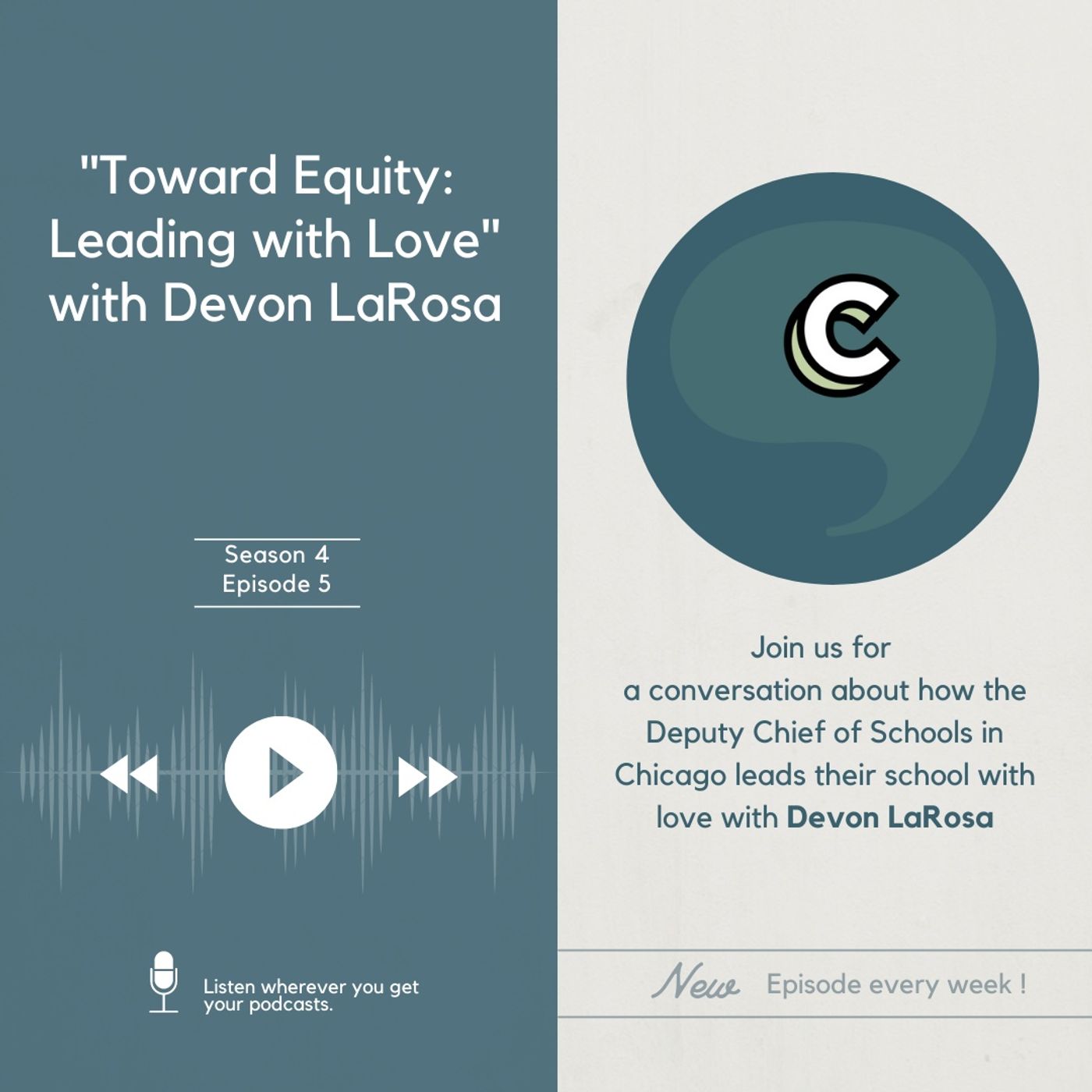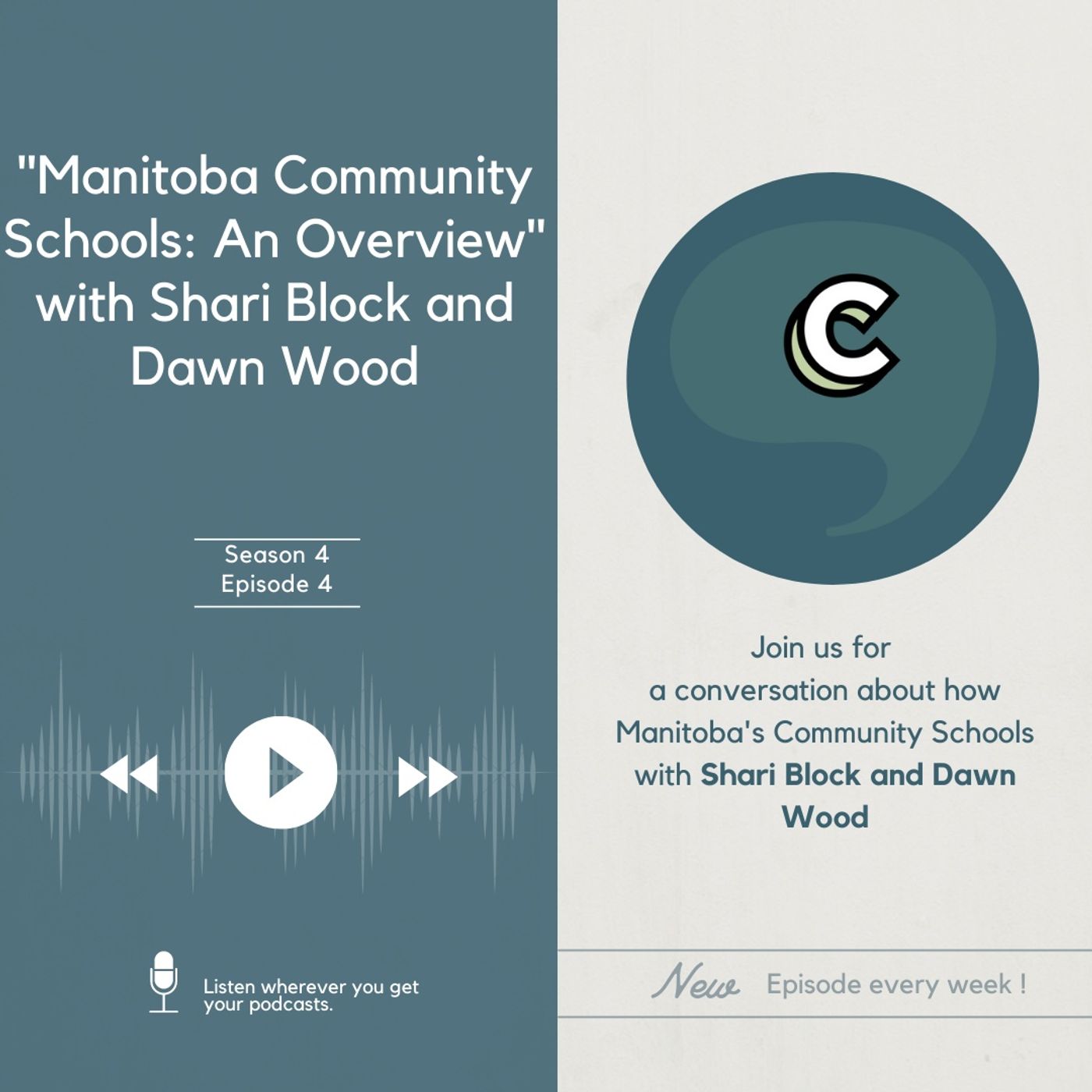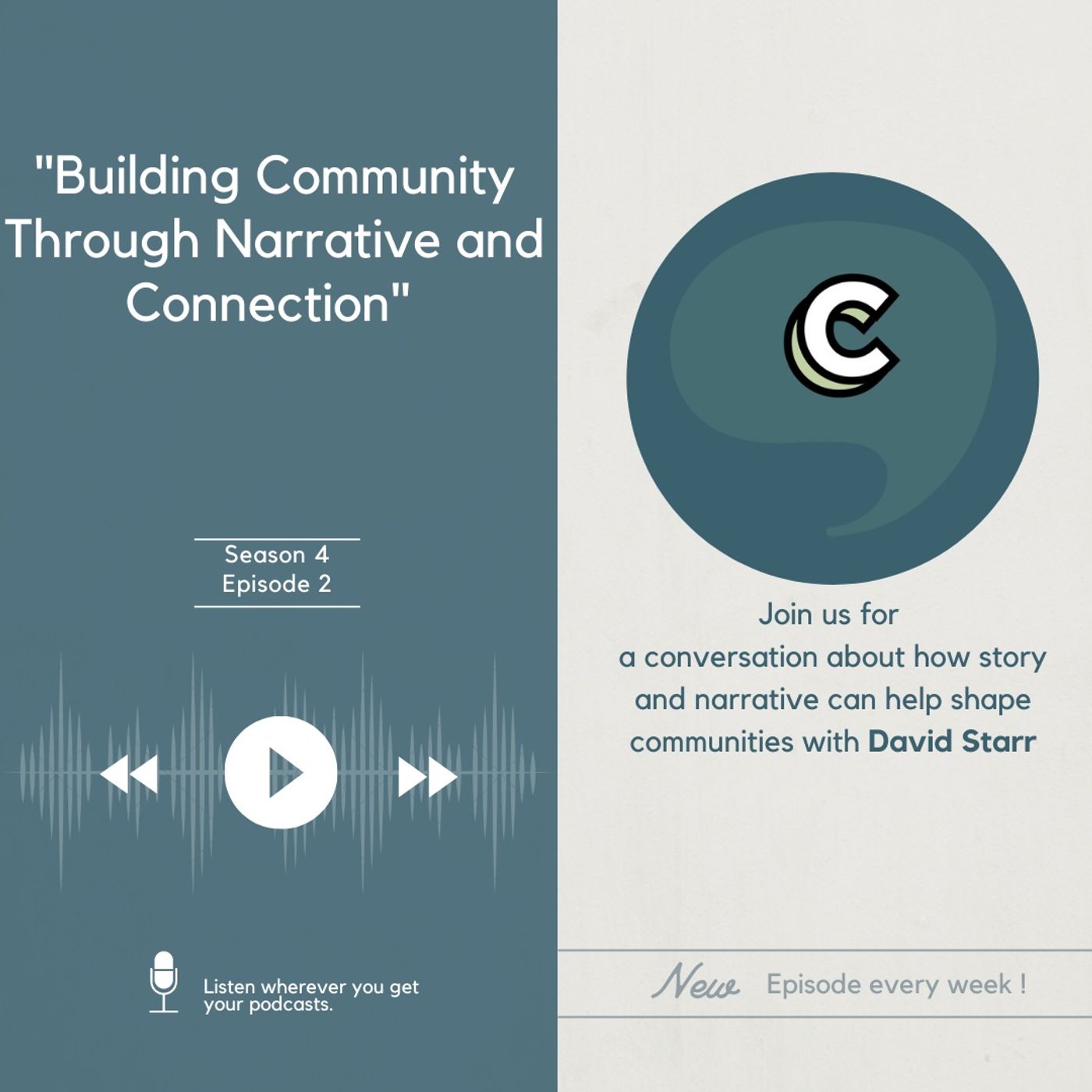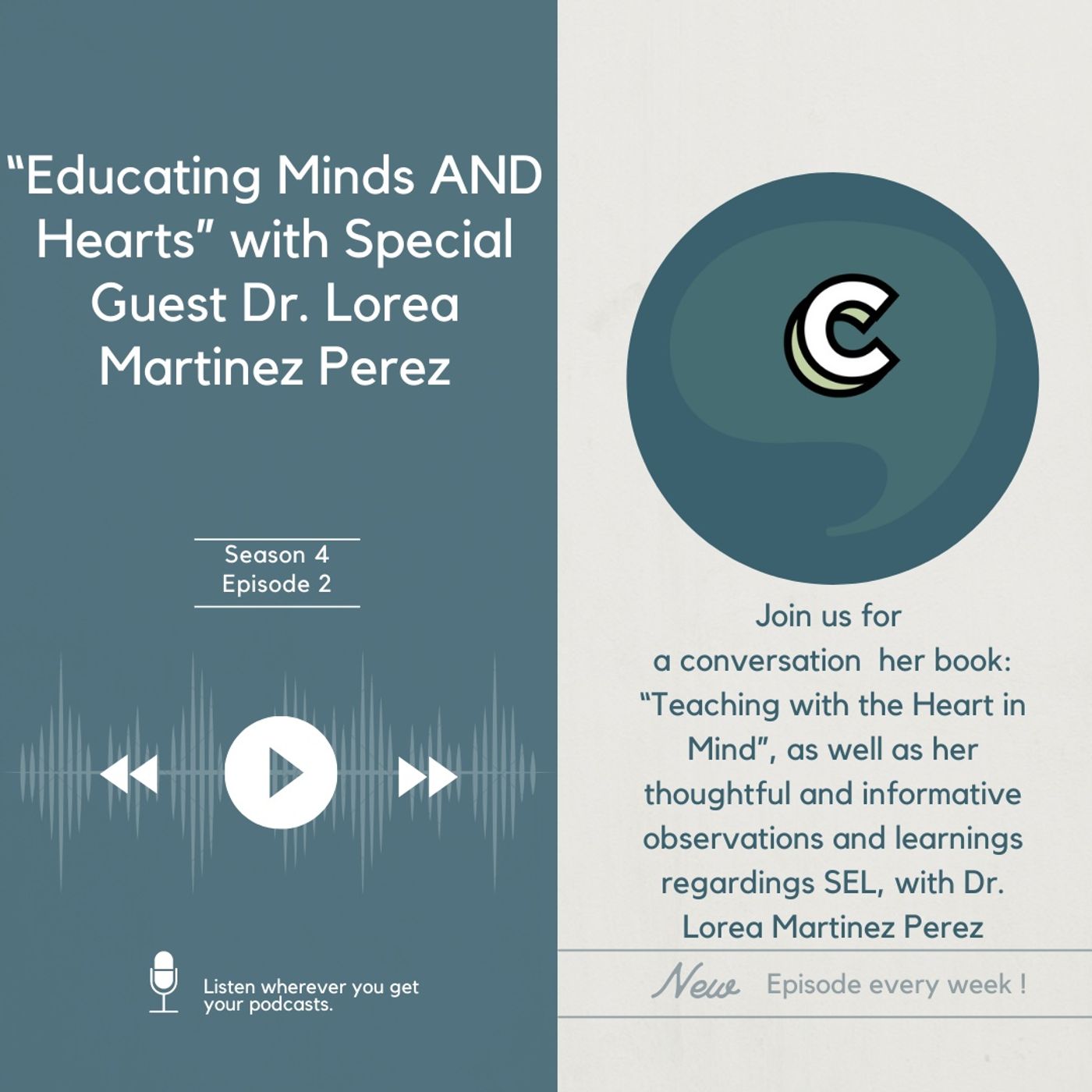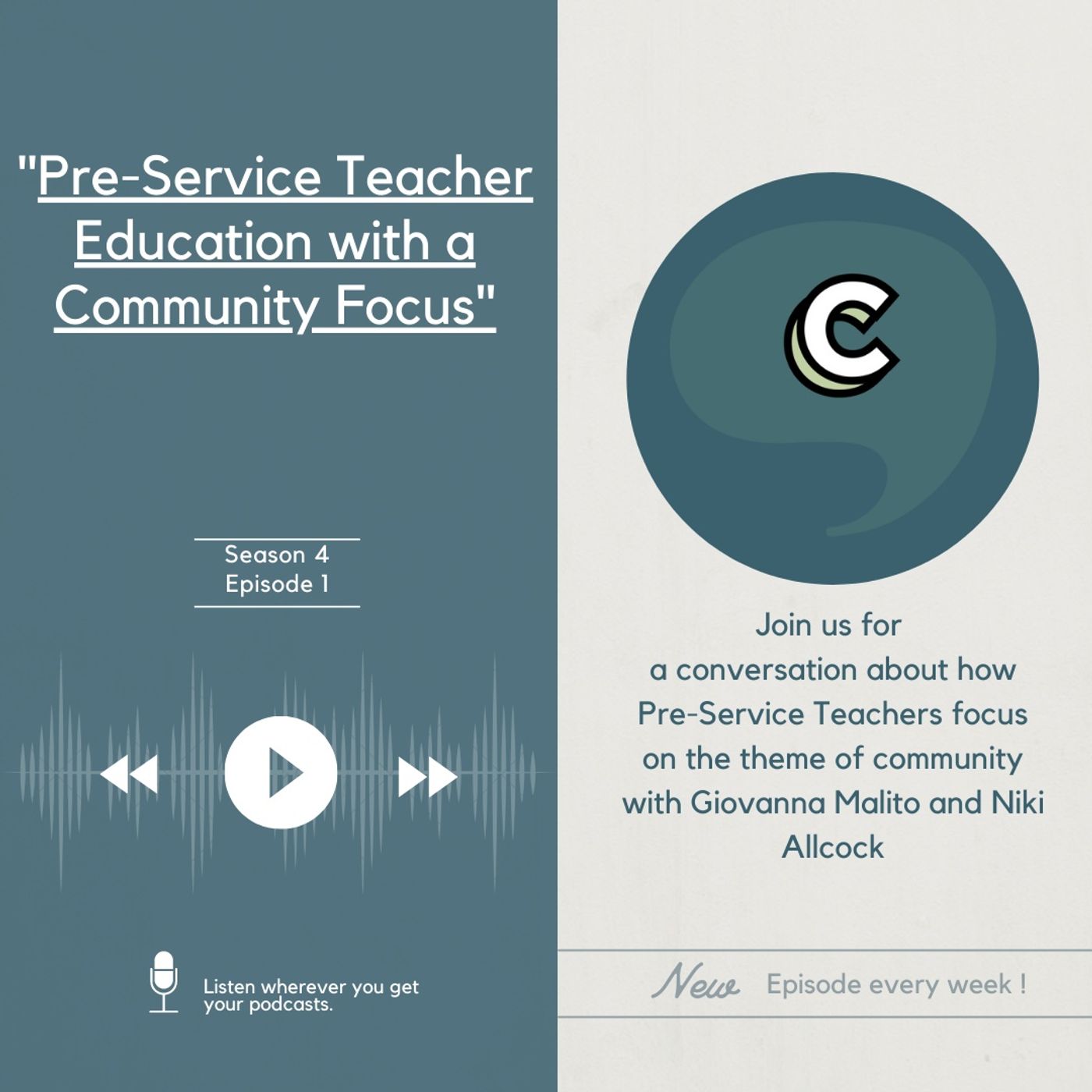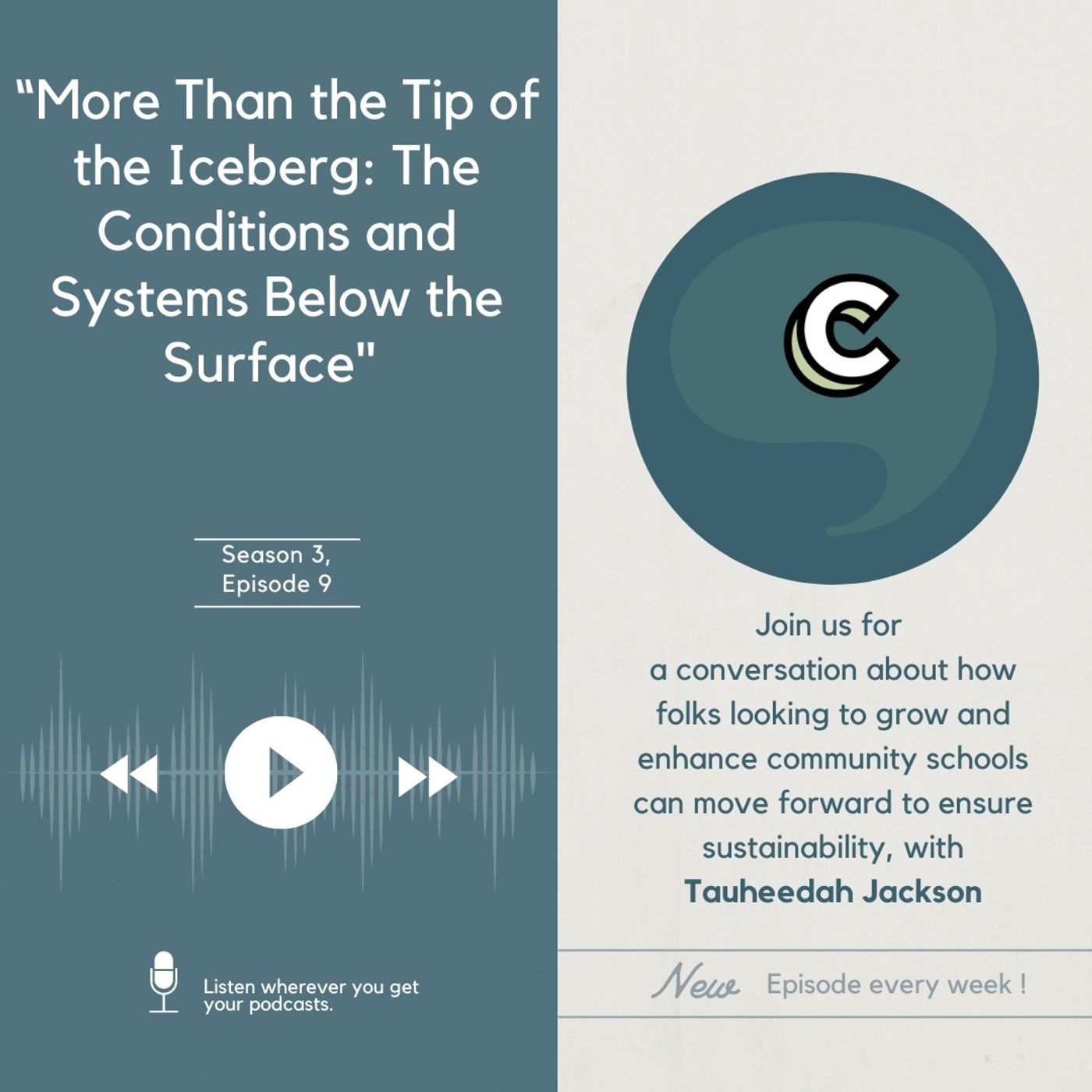Discover Community Room Podcast
Community Room Podcast

Community Room Podcast
Author: Community Room
Subscribed: 3Played: 117Subscribe
Share
© Copyright Community Room
Description
We are Community School Coordinators in BC. We dive into conversations about the magic that happens when we prioritize care & connections in schools. Hosted by Gayle Beavil and Bal Dhillon.
47 Episodes
Reverse
This episode marks the end of the Community Room Podcast! From Bal, Gayle and Corbin, thank you to all our guests, listeners and supporters throughout this incredible journey. We hope you all have enjoyed these enriching conversations as much as we have. -------------------------------------------------------------------------------------------------------The California Community Schools Partnership Program supports schools efforts to partner with community agencies and local government to align community resources to improve student outcomes. California’s state government invested a historic $3 billion dollars into the California Community Schools Partnership Program with the aim of transforming schools into community hubs that deliver a whole child education.The approach is more than just a monetary investment. UCLA is involved and have created the UCLA Center for Community Schooling. The director, Karen Hunter-Quartz led an effort to start the UCLA community school - a school that features bilingual programs in both Spanish and Korean, mirroring the languages most students speak at home in Koreatown - where the school is located. There is an on campus immigration law clinic which represents students and parents seeking visas, or asylum. Hunter-Quartz described the concept of community schools in a question “how can we design schools differently to promote these small, nurturing communities?” Her vision of the community schools that were to come were schools that embodied the four pillars of community schools:But UCLA has also developed Center X, which serves as the intersection of research and educational practice - a place where its roots are in the activist community. Initially conceived in 1992 in response to the Rodney King verdict and subsequent uprisings, Center X strives to challenge the status quo that perpetuates inequity, poor educational practice, and racism. Center X, 30 years later, is continuing to fight for racial justice. Patrisse Cullors, cofounder of Black Lives Matter, is an alumni of Center X. Center X does not claim that these gaps or inequities will be solved by schools alone, but it is committed to public schooling as one of the best democratic spaces for working to become a better, more just society. RESOURCES:https://www.cde.ca.gov/ci/gs/hs/ccspp.aspQUOTE:"To build community requires vigilant awareness of the work we must continually do to undermine all the socialization that leads us to behave in ways that perpetuate domination."- Bell HooksBIO:Annamarie Francois has over 35 years experience in education, in the areas of teaching, program development, teacher preparation and leadership. She was the director of UCLA’s Centre X’s community and equity-based teacher preparation programs for several years- and was recently appointed associate dean of public engagement of the UCLA school of education and information studies, and she represents them in local, state and national convenings. She has a long history of leading innovative educational initiatives focused on developing anti-racist, student-centered practices in education and is an advisor and representative on numerous boards. Dr. Francois’ linked-in description says she is “igniting collaborative good trouble to transform the future of K-16 educationDr. Karen Hunter Quartz currently serves as the Research Director for UCLA Community Schools. Quartz is also adjunct professor in the UCLA Graduate School of Education & Information Studies. Throughout her career, Quartz has co-authored several articles for publications like Teachers College Record and Equity and Excellence in Education. Quartz’s research, teaching, and writing focus on new school development; the struggle to recruit, prepare, and retain good urban teachers; the measurement of effective teaching; and the use of data and research to improve practice in schools. In 2007, Dr. Quartz led the design team to create the UCLA Community School, a K-12 university-partnered neighborhood public school. She is currently working on an effort to design a second UCLA Community School site in collaboration with Horace Mann Middle School in South Los Angeles. Her role as the schools’ research director involves supporting research-practice partnerships on a variety of topics, including: dual language learning; formative assessment; improvement cycles; technology integration; and college-going culture and postsecondary pathways. .
In our guest’s beautifully written and laid-out book, she conveys the universal importance of belonging and its impact, in the introduction. She says that it is not just her personal experience that has led her to believe that belonging is the thing that matters most. She says in her book: “Kids who feel they belong learn better in school. Elders with a sense of belonging stay healthy and aware . Immigrants who belong thrive in their new communities. Having a sense of belonging leads to flourishing in every environment and group, big and small, from your home to the culture at large.” (p.xiii)We believe belonging matters. If we truly belong, that means that we are welcome, in our full selves, to be involved and included. We feel seen and we feel we matter. Today we are going to talk to our guest about belonging – what it is, what it feels like, where to watch for it and how we can try to create the conditions for it – in our classrooms, our schools and in our communities.Our Guest is Dr. Susie Wise.RESOURCES:https://wwnorton.com/books/9781324006183 (Geoffrey L. Cohen - Belonging)https://www.routledge.com/Teaching-to-Transgress-Education-as-the-Practice-of-Freedom/hooks/p/book/9780415908085#https://www.designforbelonging.com/QUOTE:“As a classroom community, our capacity to generate excitement is deeply affected by our interest in one another, in hearing one another's voices, in recognizing one another's presence.” - Bell Hooks, from her 1994 book, Teaching to Transgress: Education as the Practice of Freedom (New York: Routledge)BIO:Dr. Susie Wise is a designer and educator with experience in education, tech and the social sector. She designs learning experiences and coaches leaders in innovation practices and equity design. She teaches at the d.school at Stanford where she founded and led the K12 Lab. She is also a co-creator of Liberatory Design. Susie lives with family and their wild dog Hijiki in Oakland, California.
Today we are going to hear about one lower-mainland school district community schools’ approach and model, and we will focus on one aspect, especially, that is quite unique. Our guests today are actually colleagues of mine and Bal’s, so we know them well and know that you will find this really interesting and inspiring, as you hear about one of the roles this district has created, to add to the strength of their school district’s approach. I will introduce our guests in just a moment. We hope you see that on the podcast, our central aim is that we are trying to look at how schools put care and connection at the centre of what they do – and why that is so crucial. We believe that the deepest learning occurs when there is a strong relationship between the student and the teacher and when the learner feels safe to take risks, has choice and feels agency, feels connected to the school and community, and can be seen for who they really are and for the strengths and possibilities they bring. RESOURCES:- https://earlylearning.ubc.ca/monitoring-system/mdi/mdi-overview/ (Middle Years Development Index)- https://chartlab.ca/about-ydi/ (Youth Development Index)- https://www.gov.nl.ca/education/earlychildhood/edi/ (Early Development Index)- https://www.tandfonline.com/doi/full/10.1080/10888691.2018.1537791?scroll=top&needAccess=true (Linda Darling-Hammond Article: "Implications for educational practice of the science of learning and development"QUOTE:- BIO:Sheri Brattston is currently the Managing Director of Community Education with the Burnaby School District. Her work involves supporting and developing informal and formal programs in the K-12 system, as well as the community. The purpose of these programs is to promote learning, enhance well-being, build capacity, reduce equity gaps and improve the quality of life of individuals and groups of all ages. She began her teaching career as an Early Childhood Educator in 1991 and later, she joined the Burnaby School District where she taught as an elementary teacher, continuing education teacher, and Community School Coordinator. After completing her Master’s in Education, Sheri joined a Provincial organization as the Director of Early Learning and Family Literacy. Across the Province she had the pleasure of working alongside early learning and community-based literacy organizations to help strengthen partner relationships and work together to build program capacity. The best part of her career so far has been the deep and joyful relationships she has made with diverse educators, children, families, and communities.Kevin Herd has been working with children & youth for 20+ years in every capacity from coach to recreation program development to the classroom. His passion for fostering connections finds him in his current role as Community Connect Worker in an Elementary school setting for the past 11 years. Kevin knows firsthand that the key to healthy physical and social development is having positive role models to learn from and strives to be one to all his students as well as his two young sons. In his role he is responsible for building long term connections with kids and parents from which the groundwork of mutual respect, trust, openness & accountability can grow.
This episode is going to be one in which we delve into what it is that youth need to thrive.We know that research shows that several significant elements help our students grow and develop at their best, and we have a guest today who is an expert in this area. We know, of course, it is not just good grades and academic success that enable kids to thrive in school and in life, but that there are far more pieces to the puzzle than that. There are conditions, too, that create the opportunities for growth and development of students, and creating these conditions also takes intention and time and skill. Once again, we are so fortunate to have this guest, here at the virtual kitchen table with us, so we can pick his brain and get into this topic, as this – helping our students to thrive and be their best selves – is what it is all about. RESOURCES:acebc.caQUOTE:“Every human being strives for significance, but people will always make mistakes if they do not recognize that their own significance lies in their contribution to the lives of others.” (Social Interest, Gemeinschaftsgefühl) -Alfred AdlerBIO: Nick Christofides has been working with families in the Lower Mainland for the last 23 years. He is a former teacher, coach, counsellor, department head, site based administrator and currently works with the district leadership team as the Safe and Caring Schools lead. Much of Nick’s work has been focussed in the areas of fostering connections, helping vulnerable students, promoting health and wellness and supporting the education of staff and students in the area of mental health literacy.
This week we have a very special guest who has done so much work in her classroom, district and internationally. There were so many topics we could have covered with her including anti-racism, community school frameworks, administration, international work, academia as she is studying her PhD, classroom teaching, mindfulness and so many other things. Meena Mangat joins us to talk about her anti-racism work, what healing work means and giving kids dignity; plus so much more.QUOTE:"“Research shows that healthy adult-child relationships, like those between school staff and students, safe and supportive school environments, and targeted resources and interventions all help build those protective factors. This effect is strongest when we elevate student voice, co-construct experiences grounded in a healthy sense of identity and belonging, celebrate our students’ cultures, and promote relationships anchored in dignity. We know that to support our students, we must promote the healing needed to build protective barriers and buffer against trauma.”- The Healing-Centered Framework for Chicago Public SchoolsBIO:Meena Mangat has been a teacher for 15 years in a lower mainland school district. She has taught English Language Learning, English, and she helped create an inquiry based mini school at one of her schools. She has led anti-racist dialogue groups for educators, has worked with administrators around the world, and is currently completing her PhD after finishing a Masters in Contemplative Studies. Meena is a writer who has published articles academically, one of which we will put in the show notes. She will soon be a vice-principal in her district and has been a leader in every school she has taught in since she began teaching
The conditions for learning. So much has been said about what it takes to cultivate the fertile ground for deep learning. With all of the research and scholarship on how we learn, it is hard to deny the fundamental role relationships and emotions play in learning. Today we are going to speak with two highly-respected and beloved teachers who embed their practice with structures and routines that send the message to their students that, yes, they are cared for, and are safe and are important. Their pedagogy reflects this so that the students are ready and excited to learn, yes, … and also so that their students know that all people deserve to be cared for and accepted and respected, and that to be a caring and concerned person in community with others, is important for now in school, but for onward, in life. Yes, they create a fertile ground for learning, and they also cultivate a fertile ground for building caring, community-minded, socially and emotionally students. Today we want to welcome to Community Room’s kitchen table, two classroom teachers from a community school in the lower mainland of BC: Megan Aprim and Marie Stevens. RESOURCES:- https://www.socialthinking.com/zones-of-regulation/free-stuff (Zones of Regulation)- https://poets.org/poem/work-4 (Poem by Kahlil Gibran)- https://www.portageandmainpress.com/Books/S/Stand-Like-a-Cedar (Stand Like a Cedar)- https://www.amazon.ca/Rabbit-Listened-Cori-Doerrfeld/dp/073522935X/ref=sr_1_1?keywords=the+rabbit+listened&qid=1665107776&qu=eyJxc2MiOiIwLjk0IiwicXNhIjoiMC43MyIsInFzcCI6IjAuNzUifQ%3D%3D&sr=8-1 (The Rabbit Listened)- https://www.penguinrandomhouse.com/books/653582/the-man-who-could-move-clouds-by-ingrid-rojas-contreras/- https://www.moniquegraysmith.com/ QUOTE:“Empathy is an emotional state essential to forming healthy relationships and communities. When community members have high levels of empathy for one another, there is less hurt, people regulate their own behaviour, and there is more forgiveness, acceptance and kindness. Perhaps it would be hard to measure with standard assessments, but imagine what might be possible if we spent a year prioritizing, strategizing, and striving to build empathy in our schools – empathy among teachers and students, among students and peers, among teachers and administrators, and among staff, parents, guardians and the community at large. I suspect we’d meet all kinds of goals, because the lack of empathy in our schools and society might be one of the root causes of a great deal of dysfunction. “ - Elena Aguilar: "The Power of Empathy"BIO: Megan Aprim has been teaching for 21 years, mostly as a primary teacher. Creating a safe, comfortable space where her students feel like they belong has always been a primary focus in her teaching. She loves to help her students discover a love of reading and currently has thousands of books in her classroom library. For the past 9 years, Megan has worked at an urban community school, and she enjoys taking her class to the nearby forest, where she and Marie love to plan and co-teach outdoor ed lessons. Megan has two teenage kids and seeing the education system from K-12 through their eyes has helped shape her beliefs around engagement and connection between teachers and students. Marie Stevens has been teaching for 17 years, 5 of which in a lower mainland school district. What she enjoys most about teaching is forming connections with her students and getting to know each one as an individual. She loves to joke around and learn with her students, and enjoys watching each class come together as a cohesive community throughout the year. Working at her current school introduced Marie to teaching and learning as a community through platooning, team and co-teaching. Marie and Megan have been on the same grade group team for 5 years and together they have enjoyed taking their students to the large nearby park and forest area to engage in Social Emotional Learning through nature. When not teaching, Marie can be found cycling, open water swimming, cooking or eating. Right now, however, she is on personal leave and can be found in southern France cycling, eating, exploring, hopefully swimming and definitely improving her French.
Our guest says in her book, “Love Builds Brains”, that in order for communities to prosper, we must look at what is required to support the development of our youngest children and their families. She says: “What happens in the early years, literally builds brains and establishes the pathways that allow the young to develop more and more skills. The interaction that parents have with their children, the connections that teachers make at school – all these links create the architecture of the brain.” Our guest talks about the brain and its development in adolescents, too, and we are so excited to have her here today to speak with us.RESOURCES:https://www.tallpinepress.ca/products/love-builds-brainshttps://www.youtube.com/watch?v=KCvcnJ-MRqE ("Ghosts in our Genes")https://drdansiegel.com/book/brainstorm/QUOTE:“... we humans cannot divorce ourselves from our biology, nor can we ignore the high-level sociocultural and cognitive forces that make us special within the animal kingdom. When we educators fail to appreciate the importance of students ’ emotions, we fail to appreciate a critical force in students ’ learning. One could argue, in fact, that we fail to appreciate the very reason that students learn at all.” - Mary Helen Immordino-Yang: "We feel, therefore we learn: The relevance of affective and social neuroscience to education".BIO: Dr. Jean Clinton is a Clinical Professor, Department of Psychiatry and Behavioural Neurosciences at McMaster, division of Child Psychiatry. She is on staff at McMaster Children’s Hospital with cross appointments in Pediatrics and Family Medicine, and an Associate in the Department of Child Psychiatry at Sick Children’s Hospital. She is a member on the MindUP Scientific Advisory Board as well as a MindUP for Families Advisor. She was a Fellow of the Child Trauma Academy, and is a Zero to Three Academy Fellow since 2013. She has been a consultant to children and youth mental health programs, child welfare, and primary care for over 30 years. Dr. Clinton was appointed as an education advisor to the Premier of Ontario and the Minister of Education 2014 - 2018. Dr. Clinton is renowned nationally and internationally as an advocate for children’s issues. Her special interest lies in brain development, and the crucial role relationships and connectedness play. Jean champions the development of a national, comprehensive child well-being strategy including a system of early learning and care for all young children and their families. She is equally committed to ensuring that children’s and youths’ needs and voices are heard and respected. Dr. Clinton has also authored her first book, Love Builds Brains which will be one of the things we speak to her about today.Her book can be ordered online through Tall Pines Press, on Amazon and in book stores everywhere.
Welcome back everyone! Are you ready for this second half of this Master Class on creating connected, caring communities in which the conditions for growth and learning are thriving? We think you will love it. Along with the episodes coming up with some incredible guests this Fall, we think that these curated episodes are one of the ways we can do what we set out to do when we created this podcast. So, buckle up and sit back, or get your earbuds in and walk, or rest or find a way to be comfortable and reflective, because today’s episode is featuring our local, national and international guests, as they ponder the some of the most important topics in thriving schoolsIf you did not get a chance to listen to part one, please have a look back at episode 38, as we heard our guests speak about nurturing relationships, strengthening the group, giving voice and building capacity. Today these leaders reflect on more of the ingredients needed in schools that thrive: engaging families and community, designing for sustainable change, serving our kids, nurturing well-being and… embracing the mess. Intrigued? We hope so.
Welcome back everyone! We hope you got a chance to listen to the first part of our curated episode on “Following the Leaders”, which we released last week. So much wisdom in there! And today, we are beyond excited to introduce you to our first guest of this season. We first read about our guest on the ASCD website several months ago, as she was listed as a speaker there. What we were most fascinated by was that she went into Fenger, charged with “turning the school around” with her team, and embarked on a journey, that led to, what some would say, were unorthodox practices, in an urban high school. There were important realizations about what was happening there for these students and families, and what could really make a difference. And she and her team made a huge difference, to say the least. . And … what she has done since she left Fenger, is extraordinary, and is making so much impact in Chicago . I don’t want to spoil the story, as we will ask about this when we talk to her in just a second, but we know that you, too, will find her story and journey so instructive and inspiring!RESOURCES: https://chicagobeyond.org/https://www.npr.org/2020/07/04/887239218/former-chicago-principal-discusses-schools-reliance-on-police-officershttps://www.linkedin.com/in/liz-dozier/https://twitter.com/lizdozierQUOTE: “We are a community of possibilities, not a community of problems. Community exists for the sake of belonging and takes its identity from the gifts, generosity, and accountability of its citizens. It is not defined by its fears, its isolation, or its penchant for retribution. • We currently have all the capacity, expertise, programs, leaders, regulations, and wealth required to end unnecessary suffering and create an alternative future.”― Peter Block, Community: The Structure of BelongingBIO:From education to activism, Liz Dozier has spent her career working tirelessly to disrupt the culture of inequity that is often pervasive in urban neighborhoods. In 2016, Dozier launched Chicago Beyond, an impact investor that invests in ideas, individuals, and organizations working to ensure all young people have the opportunity to live a free and full life. Since its inception, Chicago Beyond has invested more than $40 million in ideas, individuals, and organizations that fight for all youth to achieve their fullest human potential. Dozier’s ambition is born from her experiences as an educator in Chicago Public Schools. During her tenure as principal at Fenger High School, which at the time was known as one of the most violent and underperforming schools in Chicago, Fenger experienced a decrease in its dropout rate from 19% to less than 2%, a 40% increase in Freshman On-Track to graduate, and double-digit increases in attendance and the school’s state graduation rate. Dozier's work has been featured in the New York Times Best Seller How Children Succeed by Paul Tough, CNN’s docu-series Chicagoland, Aspen Ideas Festival, the Kennedy Center Forum on Mental Health, The Obama Foundation Summit, and SXSW (South by Southwest).You can find her on Twitter: @LizDozier
Welcome back everyone! As we begin this next school year, we wanted to create an episode in which you could steep yourself in inspiring ideas. We have had so many rich conversations with great minds that we wanted to pull out moments of wisdom and group them together to give us all ways to reflect upon some of the most important aspects in learning and leading for student and staff success. I am not even going to say leading in Education, specifically, because anyone who has studied leadership knows that these key components are what leaders in all sectors try to focus on. Now, we have pulled together these pieces and curated a two-part episode which will let you hear from local, national and International leaders in various roles, talk about what they believe in and do, to make schools these rich, connected communities that are places of joyful and deep learning for the students AND the staff.Part two, which will come out in the next few weeks, has reflections on family engagement, planning for sustainable change, serving our kids, well-being and what we are calling: the necessary mess.
This is PART 2 of our compilation of experts! Today we look at the themes of: family engagement, community involvement, enriching curriculum, relationships with kids and the community and on LOVE. So, get settled into your favourite podcast-listening routine: get your cup of coffee and get comfortable, or get your earbuds in and start walking, or get out in the sunshine and sit back and relax -- we think you will really enjoy this SECOND compilation of a rather joyful wisdom from our expert panel, on flourishing schools.RESOURCES:communityroombc.com
On this episode, we have taken some of the insightful and informative stories, experiences and findings our guests have shared, on some of the critical elements of schools and schooling and we pulled them together around several of the prevalent themes that continue to emerge when we look at effective pedagogy, school culture and student success. We think having these excerpts grouped around the topics that most engage, inspire and even challenge us as educators, will allow you to savour, sift and reflect deeply.Today we look at the themes of: the role of school, staff wellness, student success, equity and creating space. Sound good? So, get settled into your favourite podcast-listening routine: get your cup of coffee and get comfortable, or get your earbuds in and start walking, or get out in the sunshine and sit back and relax -- we think you will really enjoy this first compilation of a rather joyful wisdom from our expert panel, on flourishing schools.RESOURCES: communityroombc.comacebc.ca
Today we are going to talk about how to support newcomers as they settle into our communities, and help them to get connected, build a sense of belonging and move into a place of strength and leading. As the Community Schools’ strategy has, as one of its pillars, to actively engage families and the community, Community Schools have some structures and systems that focus on this and we will find out more, as we talk to a Community School Coordinator and a Settlement worker on the episode today. RESOURCES:https://www.ilctr.org/engage-families-to-support-immigrant-students/ https://www.ilctr.org/wp-content/uploads/2019/05/Four_Stages_Immigrant_Parent_Involvement.pdfhttps://www.researchgate.net/publication/260380070_ATTEND_toward_a_mindfulness-based_bereavement_care_modelQUOTE:"Schools and districts that take steps to proactively engage immigrant families will find their students more successful, their schools more vibrant and their community enriched. All immigrant parents deserve to be actively involved in their children’s schooling, and every school deserves to have the diversity of its community represented in decision-making."- Megan Rosenberg, Immigrant Learning CentreBIO: Souad Hage-Hassan has volunteered and worked in community schools for over 15 years and currently holds the position of settlement worker in a lower mainland school district. Souad was born and raised in a small town in Lebanon surrounded by extended family and a close-knit community. She describes that growing up, everyone was considered her uncle or aunt. She immigrated to Canada in 1994 at the age of 18. As a settlement worker, she hopes to use her immigration story to inspire her clients with their settlement journey as they navigate the many barriers she once experienced as a newcomer. Besides her work as a settlement worker, Souad enjoys spending time in nature and watching movies with her husband and three children.John Nanson was born and raised in BC and has also lived in Quebec, France and Manitoba. He grew up on a hobby farm, a ranch, and in urban landscapes. When John was a child he shares that he was raised by a single parent and was on social assistance for a number of years. He says through those experiences, he learned the importance of family, community and relationships. John’s education is varied and broad – ranging from studies in English Literature, Political Science and also studying and working in architecture. John first taught in North Manitoba, where he learned best practices for community engagement and the importance of traditions, perspectives and values. He says he has had the privilege to work, live and play here on the traditional territories of the Squamish, Musqueam and Tsleil-Waututh Nations, and now works as a Community School Coordinator, working with people from all around the world, and together he says, they share the richness and civic love for community, family and futures for the generations to come.
Today our episode’s theme is that of “Student Voice”. For years we have known that giving students voice and choice in schools has many benefits to their experience, their level of engagement, their ability to learn deeply and their ability to feel connected to their school. Students, as we all do, want to feel a sense of autonomy and agency in how and what they learn, and have an active role in their education – and in their lives – and in what they see going on around them.“It is not enough to simply listen to student voice. Educators have an ethical imperative to do something with students and that is why meaningful student involvement is vital to school improvement”. We will explore these themes with our guests today Effie Aadland and Ervin Cadiz.RESOURCES:https://press.uchicago.edu/ucp/books/book/chicago/E/bo4034411.htmlQUOTE:"In a curriculum that encourages student questioning, the teacher avoids unilateral transfer of knowledge. She or he helps the students develop their intellectual and emotional powers to examine their learning in school, their everyday experience, and the condition of society. Empowered students make meaning and act from reflection, instead of memorizing facts and values handed to them." - Ira Shor, "Empowering Education": Critical Teaching For Social ChangeBIO: Effie Aadland has worked in education for over 25 years in two, large lower mainland school districts. She has had a variety of roles in Secondary schools: English teacher, Learning Support Teacher, Counselor, Vice-Principal and currently is the Principal of Byrne Creek Community School and is in her 4th year in that role. Besides her work as an educator, Effie loves to travel and spend time with family and friends.Ervin is a grade 12 student at Byrne Creek Community School. From the very beginning, he's been deeply involved within the community; from being involved in his school's student government to founding his own clubs and initiatives, Ervin's experience in being involved at a community school gives him a unique perspective on the definition of community.
Today we chat with Devon LaRosa, the current Deputy Chief of Schools in Chicago. Our podcast is obviously about care and connection in schools, and when we speak about Social Emotional Learning we always must consider equity and justice in that project. Schools can be a site for oppression and the cultural reproduction of that oppression but we believe they can also be sites of liberation and justice. There are a number of reasons for this and we are looking to explore those reasons with Devon today, and we cannot wait for you to enjoy this great conversation!RESOURCES:https://www.nationalequityproject.org/https://www.linkedin.com/in/devon-larosa-40253518/QUOTE:“The stereotypical images we hold toward groups are powerful in influencing what people see and expect of students. Unless educators consciously try to undermine and work against these kinds of stereotypes, they often act on them unconsciously. Our assumptions related to race are so deeply entrenched that it is virtually impossible for us not to hold them unless we take conscious and deliberate action.” Pedro A. Noguera, "The Trouble With Black Boys: ...And Other Reflections on Race, Equity, and the Future of Public Education".BIO:Devon LaRosa is currently the Deputy Chief of High Schools in Chicago, Illinois. Devon has led an extensive career in education with over 14 years of service. He is committed to equity, excellence, academic rigor and the teaching of social responsibility through developing the capacity of others to achieve district and school goals.Devon's goals center on developing long term, transformational relationships that will impact 21st century learners, leaders, educators, families and the community. This has led him to his more recent, professional learning journey's as a National Equity Project Fellow serving families and children who have been historically under-served by our institutions and systems. Devon is also currently a Doctoral Candidate in Educational Leadership at the Aurora University, Aurora Illinois.
Today, we will explore another model of a community schools’ approach. We have an episode today where we welcome two people deeply involved in the community schools approach in the province of Manitoba. We know many folks in the US and Canada are hoping to expand and enhance community schools in their districts, and definitely in the US, funding has increased as the effectiveness of this researched-based approach is becoming more widely known, so we have invited our guests today to talk about the unique model in Manitoba.RESOURCES:https://www.edu.gov.mb.ca/csp/index.htmlQUOTE:"Research shows that integrated student supports are associated with positive student outcomes. Students receiving school-based supports often show significant improvements in attendance, behavior, social well-being, and academic achievement....It is important to note, however, that the presence of these supports alone does not automatically make a school a 'community school'. Key differentiating factors include the way in which site-based needs are identified, how the services are provided and coordinated, and their integration with the other community school pillars, especially active family engagement and collaborative leadership and practices. For example, some integrated student supports focus on case management and determine the provision of student services through a top-down approach. In contrast, comprehensive community schools start with a meaningful process for engaging students and families in identifying needs and assets and connecting with potential service-providing partners." - Quote from the Community Schools Playbook, from the Institute for Educational Leadership and communityschools.org website BIO: Dawn Wood has a Bachelor of Social Work degree from the University of Manitoba. She worked in Portage La Prairie, as the Outreach Facilitator for the Portage La Prairie School Division before joining the Indigenous Inclusion Directorate, as the Community Schools Coordinator. Shari Block has Masters Degree in Social Work from the University of Manitoba. Before joining the Manitoba Department of Education and Early Childhood Learning she worked in areas of family violence, mental health and disability services in non-profit, hospital and government. In 2008 she became the Consultant for School Social Work for the province of Manitoba, and was thrilled to join the Community Schools Unit in 2020 as Community Schools Coordinator with a focus on Mental Health and Well-being.
Welcome back to Community Room! Today’s guest has been a Vice-Principal, and a Principal in two different community schools in the Lower Mainland - David Starr has an insiders view on the what the possibilities of community schools can be. In this episode will pick his brain about not only community schools, but on the power of stories and story telling, on the potential healing benefits of narrative, and how writing and story-telling can play a role in building community.RESOURCES:https://www.amazon.ca/Colour-Glass-David-Starr/dp/1553806506/ref=sr_1_5?keywords=david+starr&qid=1651812350&sr=8-5https://www.amazon.ca/Bombs-Books-remarkable-children-exceptional/dp/1552778606/ref=sr_1_1?keywords=david+starr&qid=1651812350&sr=8-1QUOTE:“All that we are is story. From the moment we are born to the time we continue on our spirit journey, we are involved in the creation of the story of our time here. It is what we arrive with. It is all we leave behind. We are not the things we accumulate. We are not the things we deem important. We are story. All of us. What comes to matter then is the creation of the best possible story we can while we’re here; you, me, us, together. When we can do that and we take the time to share those stories with each other, we get bigger inside, we see each other, we recognize our kinship – we change the world, one story at a time…”BIO: Dave Starr is a principal with 25 years of educational experience at both elementary and secondary. He is also a prize-winning writer and the author of multiple books including “From Bombs to Books", "The Nor'Wester", "Golden Goal", “Golden Game”, “The King’s Shilling” and “Empty Net”. David is also a co-author on "Insider's Guide to K-12 Education in BC". His book "The Colour of Glass" comes out June 3! He is proud to publish with Canadian publishers Ronsdale Press, Lorimer Publishing and UBC Press.
Welcome back to our second episode is Season Four! Today we have an SEL expert with us – Dr. Lorea Martinez-Perez: she is a researcher, author and educator. We are going to talk to her about why schools need to focus on more than just the academics, and how we can do that. We want to, of course, equip our students for this complex world they face, and help them develop the skills, knowledge and processes to feel strong and healthy, to reach their goals, to care for themselves and relate to and care for others, and to make responsible decisions. We will talk with our guest today about her book: “Teaching with the Heart in Mind”, as well as her thoughtful and informative observations and learnings regardings SEL in students, in schools and in educators. RESOURCES:"Teaching with the Heart in Mind" on Amazon: https://www.amazon.ca/dp/B08R87F5SS/ref=dp-kindle-redirect?_encoding=UTF8&btkr=1https://learningpolicyinstitute.org/product/social-and-emotional-learning-case-study-humanitas-reporthttps://buffettinstitute.nebraska.edu/-/media/beci/docs/7-27-20-lorea-martinez-heart-in-mind-bridges.pdfhttps://loreamartinez.comQUOTE:“As educators, we think it’s our job to make students of color, English learners, or poor students feel good about themselves. That’s a deficit view of affirmation. In reality, most parents of culturally and linguistically diverse students do a good job of helping their children develop positive self-esteem. It is when they come to school that many students of color begin to feel marginalized, unseen, and silenced. Affirmation and rapport are really about building trust, not self-esteem.” ― Zaretta Lynn Hammond, Culturally Responsive Teaching and The Brain: Promoting Authentic Engagement and Rigor Among Culturally and Linguistically Diverse StudentsBIO: Dr. Lorea Martinez-Perez is the award-winning founder of HEART in Mind Consulting, a company dedicated to helping schools and organizations integrate Social Emotional Learning in their practices, products, and learning communities. Dr. Martinez is an educator who has worked with children and adults internationally, and she is currently a faculty member at Columbia University Teachers College, educating aspiring principals in Emotional Intelligence. Previously, she was a special education teacher and administrator.
Today’s guests are currently working in roles with Pre-service teachers at Simon Fraser University, in their Professional Development Program. They are teachers in a lower mainland city and, as is the model at SFU, have been seconded from their district. We are looking forward to hearing about what they plan, what the students do, to look at, and feel prepared for, this broad, rich role of teacher and how we facilitate the deep learning of our students. QUOTE:"Caring school communities that promote empathy and social cohesiveness have benefits for both teachers and students (Battistich et al., 1997, Battistich et al., 2000). Strong relationships between teachers and communities facilitate all stakeholders’ ability to participate and engage with each other as partners and understand each other’s backgrounds (Pais et al., in press). To create caring and supportive school communities, these relationships must be intentionally nourished."- Teaching in Community Schools: Creating Conditions for Deeper Learning (Julia Daniel, Karen Hunter Quartz, Jeannie Oakes) (https://journals.sagepub.com/doi/full/10.3102/0091732X18821126)BIO:Giovanna (Jovanna) Malito has been a teacher in BC at the primary (Grades K-3) level for the past 23 years. She has a Masters degree in Language and Literacy Education, with a focus on early literacy and family literacy. Most of her classroom teaching experience took place teaching kindergarten and working closely with families in BC’s Community Schools. She has also worked as an instructor at Oregon State University, with student teachers preparing for certification as early childhood educators. Giovanna has been working in Preservice Professional Programs at Simon Fraser University for the past 6 years, both as a faculty associate in one of the Professional Development Program’s community based modules, and currently as a Program Coordinator, supporting Faculty Associates in their work with student teachers. Relationships and connections remain at the heart of her work with colleagues and students, early learners and adult learners alike.Niki Allcock has been a teacher in BC for over 20 years. The bulk of her experience has been in Community Schools teaching early primary. She has worked as a Mentor with SFU graduate diplomas, supporting practicing teachers with field-study research. She is currently working as a Faculty Associate with SFU in the Faculty of Education Pre-service Professional Studies, supporting student teachers. She has a master’s degree in Educational Practice – focused on learning from Indigenous ways of knowing and being to foster strong classroom community. Niki has a heart for people of all ages and her passion is in building safe and rich learning communities.(*Please note that the opinions expressed by Giovanna and Niki are their own and are not shared on behalf of SFU.)This is episode is produced by Corbin Castres.
We talk with Tauheedah Jackson, Director of Place-Based Strategy and Community Initiatives at the Coalition for Community Schools and the Institute for Educational Leadership. Community Schools are so much more than extra programs and wrap-around services. These are some of the fruits of the solid foundation that is built on trusted relationships, cross-sector partnerships, the voices of all stakeholders, at all levels. The Coalition for Community Schools is a “grass roots to grass tips” organization. We talk with Tauheedah about this exciting time for Community Schools in the Us, what the Coalition does, and how folks looking to grow and enhance community schools can move forward to ensure sustainability. RESOURCES:https://www.communityschools.org/about/who-we-are/https://iel.org/QUOTE:"I love to garden, and gardening serves as a good metaphor for how we should think about creating conditions in our schools that foster equity and promote learning for all children. If I want to grow big, beautiful cantaloupes, I know that the key is getting the conditions just right. They need sunlight, fertile soil and the right balance of water. If the cantaloupes don’t grow, I don’t blame the cantaloupes.Gardeners – like schools – cannot control everything. Weather and pestilence may undermine my melon harvest. Likewise, schools cannot undo a child’s trauma or provide him or her with a stable home life.But educators do have the power to create the conditions that will make it more likely for that child to feel supported so that she can learn and thrive. By focusing upon conditions they can control, educators are more likely to make a difference."- https://holdsworthcenter.org/blog/equity-isnt-just-a-slogan/BIO:Tauheedah Jackson is the Director of Place Based Strategy & Community School Initiatives. She partners with local, state, and national leaders to build sustainable community ecosystems through the development of the Community Schools strategy. Tauheedah brings to IEL over 22 years experience working in youth development, local government, philanthropy, school districts and out-of-school time organizations. As the Director of the Hartford Partnership for Student Success, Tauheedah provided strategic direction for a collaborative partnership that founded and funded the community schools initiative in Hartford, Connecticut. Under her leadership, Hartford Community Schools became locally and nationally recognized as an exemplar for its systems-building work. Before joining IEL’s team in 2019, Tauheedah served as a member of the steering committee and the co-chair for the Coalition for Community Schools’ Leadership Network.A native of Bridgeport, Connecticut and first-generation college graduate, Tauheedah has a background in government and secondary education. She will complete her master’s degree in Education and Policy and Management, at the Harvard Graduate School of Education in May 2022. She is a sought-after presenter and facilitator and serves as a member of several local and national boards and advisories. She resides in Connecticut with her family, including her 3 sons.


